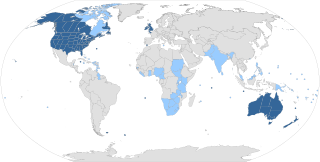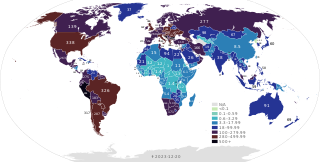
Creutzfeldt–Jakob disease (CJD), also known as subacute spongiform encephalopathy or neurocognitive disorder due to prion disease, is an invariably fatal degenerative brain disorder. Early symptoms include memory problems, behavioral changes, poor coordination, and visual disturbances. Later symptoms include dementia, involuntary movements, blindness, weakness, and coma. About 70% of people die within a year of diagnosis. The name Creutzfeldt–Jakob disease was introduced by Walther Spielmeyer in 1922, after the German neurologists Hans Gerhard Creutzfeldt and Alfons Maria Jakob.

Poliomyelitis, commonly shortened to polio, is an infectious disease caused by the poliovirus. In about 0.5 percent of cases, it moves from the gut to affect the central nervous system, and there is muscle weakness resulting in a flaccid paralysis. This can occur over a few hours to a few days. The weakness most often involves the legs, but may less commonly involve the muscles of the head, neck, and diaphragm. Many people fully recover. In those with muscle weakness, about 2 to 5 percent of children and 15 to 30 percent of adults die. Up to 70 percent of those infected have no symptoms. Another 25 percent of people have minor symptoms such as fever and a sore throat, and up to 5 percent have headache, neck stiffness, and pains in the arms and legs. These people are usually back to normal within one or two weeks. Years after recovery, post-polio syndrome may occur, with a slow development of muscle weakness similar to that which the person had during the initial infection.

The Supreme Court of the United States (SCOTUS) is the highest court in the federal judiciary of the United States of America. It has ultimate and largely discretionary appellate jurisdiction over all federal and state court cases that involve a point of federal law, and original jurisdiction over a narrow range of cases, specifically "all Cases affecting Ambassadors, other public Ministers and Consuls, and those in which a State shall be Party." The Court holds the power of judicial review, the ability to invalidate a statute for violating a provision of the Constitution. It is also able to strike down presidential directives for violating either the Constitution or statutory law. However, it may act only within the context of a case in an area of law over which it has jurisdiction. The Court may decide cases having political overtones but has ruled that it does not have power to decide non-justiciable political questions.
A chief executive officer (CEO), chief administrator officer, central executive officer, or just chief executive (CE), is one of a number of corporate executives in charge of managing an organization – especially an independent legal entity such as a company or nonprofit institution. CEOs find roles in a range of organizations, including public and private corporations, non-profit organizations and even some government organizations. The CEO of a corporation or company typically reports to the board of directors and is charged with maximizing the value of the business, which may include maximizing the share price, market share, revenues or another element. In the non-profit and government sector, CEOs typically aim at achieving outcomes related to the organization's mission.

Measles is a highly contagious infectious disease caused by measles virus. Symptoms usually develop 10–12 days after exposure to an infected person and last 7–10 days. Initial symptoms typically include fever, often greater than 40 °C (104 °F), cough, runny nose, and inflamed eyes. Small white spots known as Koplik's spots may form inside the mouth two or three days after the start of symptoms. A red, flat rash which usually starts on the face and then spreads to the rest of the body typically begins three to five days after the start of symptoms. Common complications include diarrhea, middle ear infection (7%), and pneumonia (6%). These occur in part due to measles-induced immunosuppression. Less commonly seizures, blindness, or inflammation of the brain may occur. Other names include morbilli, rubeola, red measles, and English measles. Both rubella, also known as German measles, and roseola are different diseases caused by unrelated viruses.
Roe v. Wade, 410 U.S. 113 (1973), was a landmark decision of the U.S. Supreme Court in which the Court ruled that the Constitution of the United States protects a pregnant woman's liberty to choose to have an abortion without excessive government restriction. The decision struck down many U.S. federal and state abortion laws. Roe fueled an ongoing abortion debate in the United States about whether or to what extent abortion should be legal, who should decide the legality of abortion, and what the role of moral and religious views in the political sphere should be. It also shaped debate concerning which methods the Supreme Court should use in constitutional adjudication.

The federal government of the United States is the national government of the United States, a federal republic in North America, composed of 50 states, a federal district, five major self-governing territories and several island possessions. The federal government is composed of three distinct branches: legislative, executive, and judicial, whose powers are vested by the U.S. Constitution in the Congress, the president and the federal courts, respectively. The powers and duties of these branches are further defined by acts of Congress, including the creation of executive departments and courts inferior to the Supreme Court.

The Zodiac Killer is the pseudonym of an unidentified serial killer who operated in Northern California in the late 1960s. The case has been described as the most famous unsolved murder case in American history, becoming a fixture of popular culture and inspiring amateur detectives to attempt to resolve it.

Abdul Rashid Salim Salman Khan is an Indian actor, film producer, and television personality who works in Hindi films. In a film career spanning over thirty years, Khan has received numerous awards, including two National Film Awards as a film producer, and two Filmfare Awards for acting. He is cited in the media as one of the most commercially successful actors of Indian cinema. Forbes included him in their 2015 list of Top-Paid 100 Celebrity Entertainers in the world; Khan tied with Amitabh Bachchan for No. 71 on the list, both with earnings of $33.5 million. According to the Forbes 2018 list of Top-Paid 100 Celebrity Entertainers in world, Khan was the highest-ranked Indian with 82nd rank with earnings of $37.7 million. He is also known as the host of the reality show, Bigg Boss since 2010.

Neko Richelle Case is an American singer-songwriter and member of the Canadian indie rock group the New Pornographers. Case has a powerful, untrained contralto voice, which has been described by contemporaries and critics as a "flamethrower," "a powerhouse [which] seems like it might level buildings," "a 120-mph fastball," and a "vocal tornado". Critics also note her idiosyncratic, "cryptic," "imagistic" lyrics, and credit her as a significant figure in the early 21st-century American revival of the tenor guitar. Case's body of work has spanned and drawn on a range of traditions including country, folk, art rock, indie rock, and pop and is frequently described as defying or avoiding easy generic classification.

The United States Court of Appeals for the Ninth Circuit is a federal court of appeals that has appellate jurisdiction over the U.S. district courts in the following federal judicial districts:

Emmett Louis Till was a 14-year-old African American who was lynched in Mississippi in 1955, after being accused of offending a white woman in her family's grocery store. The brutality of his murder and the fact that his killers were acquitted drew attention to the long history of violent persecution of African Americans in the United States. Till posthumously became an icon of the civil rights movement.

Letter case is the distinction between the letters that are in larger uppercase or capitals and smaller lowercase in the written representation of certain languages. The writing systems that distinguish between the upper and lowercase have two parallel sets of letters, with each letter in one set usually having an equivalent in the other set. The two case variants are alternative representations of the same letter: they have the same name and pronunciation and are treated identically when sorting in alphabetical order.

English is a Germanic language of the Indo-European language family, originally spoken by the inhabitants of early medieval England. It is named after the Angles, one of the ancient Germanic peoples that migrated from Anglia, a peninsula on the Baltic Sea, to the area of Great Britain later named after them: England. The closest living relatives of English include Scots, followed by the Low Saxon and Frisian languages. English is genealogically a West Germanic language, though its vocabulary is also hugely influenced by Old Norman French and Latin, as well as by Old Norse.

The COVID-19 pandemic, also known as the coronavirus pandemic, is an ongoing global pandemic of coronavirus disease 2019 (COVID-19) caused by severe acute respiratory syndrome coronavirus 2 (SARS-CoV-2). The novel virus was first identified from an outbreak in the Chinese city of Wuhan in December 2019, and attempts to contain it there failed, allowing it to spread across the globe. The World Health Organization (WHO) declared a Public Health Emergency of International Concern on 30 January 2020 and a pandemic on 11 March 2020. As of 29 January 2022, the pandemic had caused more than 370 million cases and 5.65 million deaths, making it one of the deadliest in history.

This article provides a general overview and documents the status of locations affected by the severe acute respiratory syndrome coronavirus 2 (SARS-CoV-2), the virus which causes coronavirus disease 2019 (COVID-19) and is responsible for the COVID-19 pandemic. The first human cases of COVID-19 were identified in Wuhan, the capital of the province of Hubei in China in December 2019.

Coronavirus disease 2019 (COVID-19) is a contagious disease caused by severe acute respiratory syndrome coronavirus 2 (SARS-CoV-2). The first known case was identified in Wuhan, China, in December 2019. The disease has since spread worldwide, leading to an ongoing pandemic.

The COVID-19 pandemic in the United States is part of the worldwide pandemic of coronavirus disease 2019. Since January 2020, 74,067,112 confirmed cases have been reported with 905,661 deaths, the most of any country, and the nineteenth-highest per capita worldwide. As many infections have gone undetected, the Centers for Disease Control and Prevention (CDC) estimated that, as of May 2021, there could be a total 120.2 million infections in the United States, or more than a third of the total population. COVID-19 is the deadliest pandemic in U.S. history; it was the third-leading cause of death in the U.S. in 2020, behind heart disease and cancer. From 2019 to 2020, U.S. life expectancy dropped by 3 years for Hispanic Americans, 2.9 years for African Americans, and 1.2 years for white Americans. These effects have persisted as U.S. deaths due to COVID-19 in 2021 exceeded those in 2020.

The Delta variant (B.1.617.2) is a variant of SARS-CoV-2, the virus that causes COVID-19. It was first detected in India in late 2020. The Delta variant was named on 31 May 2021 and had spread to over 179 countries by 22 November 2021. The World Health Organization (WHO) indicated in June 2021 that the Delta variant was becoming the dominant strain globally.

The Omicron variant (B.1.1.529) is a variant of SARS-CoV-2 that was first reported to the World Health Organization (WHO) from South Africa on 24 November 2021.
















